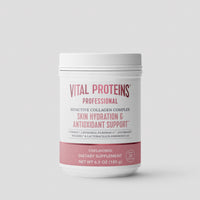Healthy eating doesn't have to break the bank. Shopping smart by planning, buying in bulk and cooking from scratch is good for your budget (and your health!). Instagramable avocado toast, here you come (overpriced brunch not included).
Don't believe us? Just ask the dietitians: "A nutritious diet is completely doable with some planning, creativity and a good bit of cooking at home," says Amy Davis, RD, LDN. Here are the 13 best tips for making healthy eating on a budget a reality, according to the food pros.
Make A List
According to Sergio Pedemonte, certified personal trainer and CEO of Your House Fitness, making a list — and sticking to it — is key to eating healthy within a budget. "There is no need to venture out from the list once you're in the supermarket and see a special or something eye-catching." Let's be real: It's almost too easy to impulsively grab too much.
Something you should consider when making a list? Your weekly mealplan.
"I suggest creating a menu for a week or two and using that to create your shopping list," says Eni Kadar, DPT. "You'll also save on buying lunches and dinners when you've planned ahead!"
Determine Your Dietary Goals
Think about what you need in your diet, including proteins, carbs, fats, vitamins and nutrients. This can help you get the best bang for your buck and reach those dietary goals. For example, "a box of eggs [a dozen] is less than $4, and it contains healthy fats and protein," says Pedemonte. This is way cheaper than using steak as your protein.
Davis agrees, adding that buying an entire chicken instead of the individual cuts of meat costs less per ounce. "Plus, you can use the bones and veggie scraps to make a savory and nutritious bone broth."
Take Stock Of Your Pantry
Before creating a list, check what you have in your fridge, freezer and pantry. Knowing what you already have is key to preventing food waste and overbuying food, says Davis. Forget that "out with the old and in with the new" concept. Make it a priority to incorporate those foods into your meals for the week.
Consider Cheaper Protein Alternatives
While foods such as chicken and fish are often considered king when it comes to protein, don't discount other alternatives. In this case, plant-based protein options are where it's at, explains Davis.
She recommends beans (canned is good, but dried is cheaper) tofu, nuts and seeds. These are all items that you might consider buying in bulk to save money, adds Julie Chen, M.D., Founder of Wisdom in Wellness.
Another protein source you may not have considered is cottage cheese. "It’s an inexpensive protein that is versatile,” says Lisa Defazio, MS, RDN. "You can spread it on toast, add to eggs and eat with fruit."
Avoid Pre-Cut Items
Pre-cut veggies and fruits may make your life easier, but come at a cost. "Keep in mind that you pay for convenience, so chopping your own fruits and vegetables will always always be cheaper than the pre-cut variety," says Davis.
One loophole is buying pre-cut frozen fruit and veggies. According to Defazio, they are nutritious, cheaper than their fresh counterparts and last for a long time in the freezer (way longer than that package of spinach you always throw out).
Already-frozen fruits and veggies are also perfect for smoothies, adds Joey Thurman, kuudose founding celebrity fitness trainer, CES, CPT, FNS.
Buy Generic
You might've noticed your favorite grocery store has its own brand of frozen foods, canned veggies and more. "They often are great quality and less expensive than name brands," says Defazio.
If you're on the fence, Kadar recommends comparing ingredients and nutrition labels in the generic brand versus your favorite name-brand products to see if you can spot any differences. "I often find generic brands of frozen fruits and vegetables are less expensive with no difference in quality," says Kadar.
Shop Sales
It's time to put on your bargain-hunter hat. Meat, for instance, is great to stock up on when it's on sale. "I typically buy meat when it's on sale and then freeze it," explains Kadar. "When I'm ready to cook the meat, I'll thaw it in the refrigerator overnight."
Comparing prices of different brands and different sizes of the same brand to see which has a lower unit price is another great way to save money, according to Colleen Wysocki, M.S., RDN and Owner of ZEST Nutrition. "The unit price is usually located on the shelf directly below the product," she says. "If it's not there, divide the total cost by the number of ounces or grams it contains and compare that with another brand’s unit price."

Cook From Scratch
"Save money by cutting back on buying pre-prepared meals along with fast food takeaways," says Hannah de Gruch, RD.Eat your leftovers the next day to prevent swinging through the drive-thru for lunch or dinner.
You don't even have to be a master chef to create healthy, delicious meals. Simply focus on making a hero for all your meals, says Thurman. "This can be making a bunch of chicken breasts ahead of time and using that as the main star of your meals for the next few days," he explains to Lively. "Throw it in a salad, add to your eggs or even make a chicken salad."
Enhance Your Snacks
"When you look at the price per serving of protein powder it’s less than .50 per serving for most brands," explains Thurman. He recommends adding some protein powder or collagen — this is where Vital Proteins® Original Collagen Peptides ($25; shop now onvitalproteins.com) comes in. Add to your yogurt, smoothie or homemade muffins. Check more deliciousVital Proteins recipes you can make from scratchhere. This way, you save money while also skipping the added sugar in some pre-made foods.
Add Oil To Your Healthy Fat Rotation
As amazing as healthy fats are, they tend to lean on the pricier side. You don’t have to skip the almond butter, hummus and avocado entirely, but every once in a while, use this helpful hack fromChen. "Simply cooking foods in avocado oil or drizzling olive oil onto vegetables are great ways to get in healthy fats," she explains toLively. "Some of my patients planted avocado trees in their yard and are able to use that for healthy fat intake and that's super cost effective."
Buy In Bulk
It’s time to put that wholesale membership to good use! "Most of the time you can get a bigger discount for buying your food in bulk and that drops down the price per serving," says Thurman.
For example, buying the 32 oz. tubs of yogurt instead of individual cups or buying grains and nuts from the bulk section instead of pre-packaged bags, according to Wysocki.
Know The In-Season Produce
If you've ever experience sticker shock when shopping for your favorite fruits and veggies, it may be because they are out of season. It also means the foods aren't as fresh. So, know what's in season before you hit the produce aisle. This makes shopping for fruits and vegetables easier and cheaper, says Wysocki. Your local farmer's market is another great source for seasonal produce.
"Just remember that some fresh fruits and vegetables don’t last long," says Wysocki. "Buy small amounts at a time to avoid having to throw away spoiled produce."
Buy Canned
Just because it comes in a can doesn’t mean it’s not healthy.
Canned produce has equal or better nutrition as fresh fruits and vegetables because they’re picked at their peak and preserved immediately, explains Wysocki. (Just be sure to avoid canned veggies that contain added sodium.)
If you do grab a can with added salt, rinse the veggies before eating to reduce sodium. She recommends a similar approach to canned fruits: "Buy fruits canned in their own juice instead of syrup to reduce your sugar intake."
















